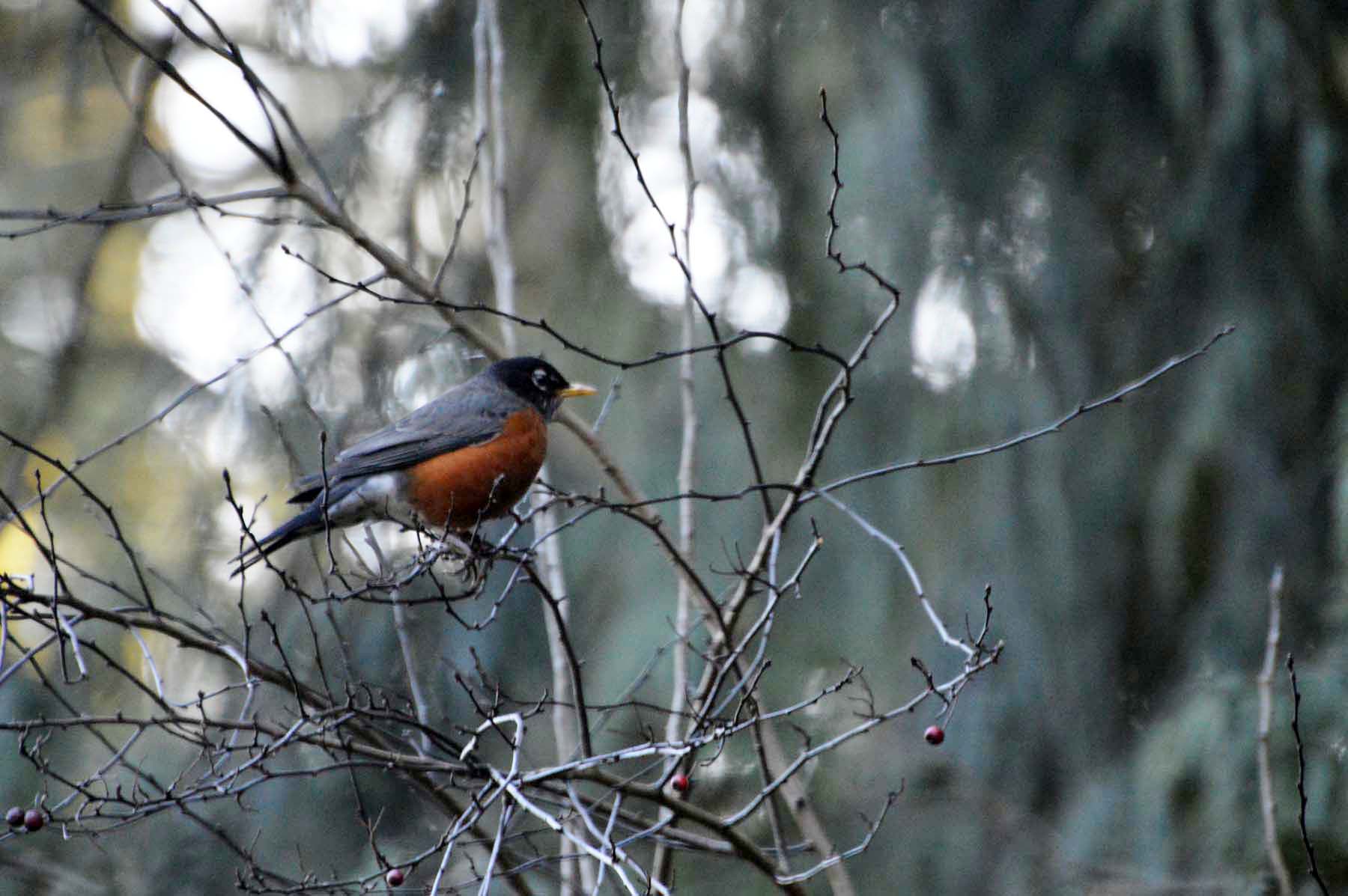A friend sent me an essay from the New Yorker this week – I somehow managed to avoid subscribing to the magazine for all of my decades on American shores. Lessons for the End of the World is a moving, lyrical piece by poet and MacArthur fellow Hanif Abdurraqib. It braids together strands of reactions to loss, material and immaterial. I read it as a flock of robins descended on the Hawthorne tree in front of my window, in search for the last remaining berries.
I agreed with the author’s acknowledgement that the loss of personally meaningful, irreplaceable objects requires psychological adjustment, regardless of the ways things get lost, accidentally dropped at an airport, or violently destroyed by all-consuming fires. The essay embeds his reactions within a tapestry of reminders about women’s writings on trauma and loss, Nikki Giovanni and Octavia E. Butler among them. Butler’s Parabel of the Sower is currently making a come-back in public discourse, its seemingly prescient descriptions of a society destroyed by fiery climate catastrophe and held in the thralls of authoritarian violence a detailed narrative, all too fittingly depicting this moment.

As I wrote 2 years ago (see below,) many of her novels manage to make the grief attached to loss, particularly traumatic loss, astoundingly explicit. We mourn what is taken from us, often irreplaceably so, whether destroyed heirlooms, or body parts, no longer being physically whole. Simultaneously, though, if more implicitly, she points us to the psychological opportunities attached to new beginnings. Loss raises awareness of our ability to make choices, how to deal with the loss itself, how to move forward both as individuals and with regard to the structures that surround and constrain us. Living through existentially hard times can produce new ways of thinking, acting and re-acting, a shift in values that could lead to favor mutual aid and empathy.
Abdurraqib’s essay focuses on that as well, Butler’s prescription for looking at change as the ultimate power, “the innovation and adaptation required to survive the unsurvivable.” He quotes Butler:
“There’s no single answer that will solve all of our future problems. There’s no magic bullet. Instead there are thousands of answers, at least. You can be one of them if you choose to be.”
In this regard, she is a beacon of hope, believing in our potential to grow new life out of the ashes, a radically changed life enabling us to survive the ways this planet, our nations and all of us contained within it, will continue to be harmed.

The graveyard with so much old growth burnt as well a month ago, but her grave is unharmed. The bookstore Octavia’s Bookshelf in Pasadena has become a hub for mutual aid after the Eaton fire, just as she would have envisioned.

***
I wonder. There might be one aspect of losing irreplaceable things that helps, in some paradoxical ways, to move from grief to renewal: centering, retroactively, human connectedness.

As a personal example, I lost a number of things in the Eaton fire that originated in my own history, things I had given the kids as tokens of their belonging to a loving network of generations of people they never had a chance to meet. (Let me hasten to add, they are inconsequential compared to what others have lost, more closely connected to their current lives.)
For one, there was a garment my mother had knitted, a beautiful cape for a baby in blue and purple hues. Honestly, it had been waiting in a closet for decades, out of awareness, and once delivered to the young family, I never thought of it again. Until now, when I try to remember the pattern and constantly think of my mother knitting, a craft we have in common (I might go as far as calling it a shared form of therapy). Not only was the cape something she physically touched, but its loss is now a reminder, very much at the forefront of my daily consciousness, of how she taught me, with much patience, something beneficial and creative, knitting – a lasting connection, despite her early death in 1983.

A previous version of this hat for an owl-loving toddler burnt as well – but I was able to knit it again. Somehow the ability to replace things is wonderful but also highlights the inability to retrieve others.
Secondly, I had, quite literally a week or so before the fire, sent an old photograph of my grandfather to the kids. It had languished in a box, not even an album, for decades, must have come down to me when my father died in 2002 and I took a few of the things he had saved back to the U.S. It was taken in the battlefield trenches in France during WW I, on his (and coincidentally my mother’s) birthday on February 8th, with my Opa holding a guitar, at the center of a group of painfully young, thin and empty-eyed soldier. I have so many questions. Would you bring your instrument, as a musician, to the front? Was it provided as some sort of means to distract the company? Was music what allowed him to survive two world wars unscathed, as a peaceful, curious, nature-loving, gentle human being? These questions did not preoccupy me until the burning of the photograph.

The losses force us to remember the people attached to the items, and, in turn, our attachment to them. Maybe that focus on relationships, on belonging even after death, signals the way to adapt and move on. Just as Octavia Butler spelled out, the secret to survival lies in communal embeddedness and reciprocity. The love we received and that we can now pay forwards will never be contained in objects only, it exists independently, inviolable by flood and fire. That solace might help staunch the grief.

In honor of my Opa’s real love, the double bass, here is a beautiful rendition of a Bottesino concerto.
